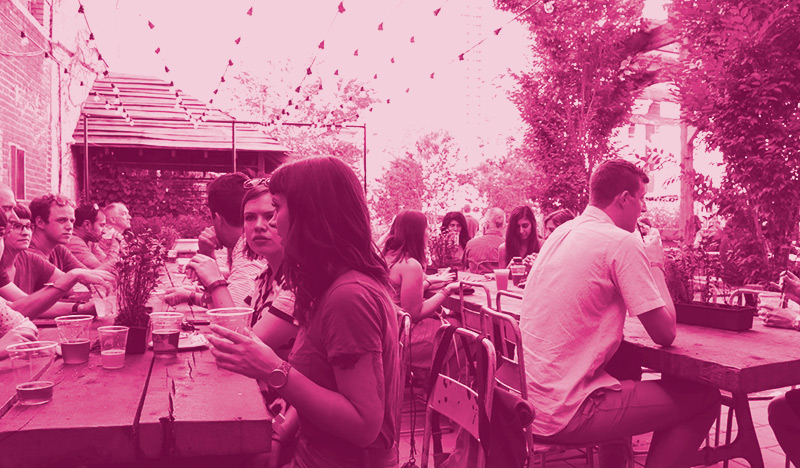Connor Barwin slides all 6’5” of his chiseled frame into a booth at Fairmount’s La Calaca Feliz, one of his favorite haunts. “He hasn’t been here before,” he tells the waiter, nodding in my direction. “So I told him it doesn’t even make sense to look at the menu. You gotta have the sea bass.”
They are in agreement, both feeding off the other’s enthusiasm. I concur and, after a couple of hours of head-spinning conversation, realize that the moment was a harbinger of what was to come: Connor Barwin, in an era of too many dour-faced, Neanderthal jocks, is all about his enthusiasms. He’s this wide-eyed gentle Goliath, ever curious, grilling me on the history of this city that, more and more, he’s representing in a type of ambassador role. Last week, there he was, live on the Fox-29 Morning Show, knocking on an unsuspecting homeowner’s door and helping to direct the installation of a green roof for NRG Energy, one of the nation’s leading green energy providers. (In the off-season, Barwin heads to Haiti and actually helps do the installation; this close to the season’s kickoff, however, he was relegated to a ceremonial role). And this Saturday at Union Transfer, he’ll be hosting his second annual Make The World Better concert; last year, $185,000 was raised for Ralph Brooks Park in Point Breeze. This time, the renovations are targeted for South Philly’s Smith Playground and include rec center building improvements, new football and baseball fields, and installation of green stormwater infrastructure. (Purchase tickets here)
Barwin is an active citizen of Philadelphia. “I read a lot of Jane Jacobs, who said that cities are all about feet on the street,” he says. “I like to be part of that energy.”
This is not for show. Countless athletes lend their names to foundations and good works, enabling them to honestly mouth familiar platitudes about “giving back” that pepper post-game interviews. Barwin—who is as hands-on with his Foundation as any athlete I’ve ever seen—is engaged in the city to the point of self-definition. It is who he is. You see him riding his bike from Center City to Fairmount or taking SEPTA. Instead of cloistering himself in jockdom, he hangs out with musicians, artists, writers—the type of characters that make cities unique and vibrant. He walks our streets, soaking up our architecture, searching out quirky joints and interesting people, as a matter of ingrained ideology.
“It’s not something I ever gave a lot of thought to,” he says now, digging into some guac and chips. “It just comes naturally. I read a lot of Jane Jacobs, who said that cities are all about feet on the street. I like to be part of that energy.”
Barwin lives in Center City—one of the few Eagles to do so. The others live in South Philly, near the team’s practice facility, or in South Jersey, walled off in gated communities. “I’m trying to get more of my teammates to move into the heart of the city,” he says.
As the night wears on, we talk football—Barwin sings the praises of Chip Kelly’s vision—but we spend more time on politics, art and culture. A little red-faced, because fawning is not usually in my repertoire, I tell him that he’s not what an athlete should be, so much as what a citizen ought to be. Active and participatory. Curious and enthusiastic. I tell him of Jerry Seinfeld’s old observation, that, in the cold light of day, our pro sports addiction is silly. “The players aren’t even from the cities they represent,” Seinfeld said. “So you’re rooting for a shirt. You’re cheering for laundry.”
“I love that,” Barwin says, laughing. He goes on to explain that his upbringing insured he would never become just a shirt. His father, Tom Barwin, was the city manager in the working-class town of Hazel Park where Barwin grew up, just outside Detroit. (A tattoo of the Detroit skyline adorns his right arm.) Tom is now the city manager in Sarasota, Florida; dinner table conversation in his formative years was about the wisdom of smart cities, sustainability and public transit. No wonder he’s reading Jane Jacobs—a late-bloomer when it came to football, he’s studied urban planning longer than the game that is now his vocation.
Barwin has big plans for his Foundation, and for Philadelphia. This Saturday, you can find him among a sea of vintage-wearing twentysomethings rocking out to, among others, the soulful stylings of The Suffers, whose singer, Kam Franklin, can rattle the walls, and he promises to be basking in the thing that only big cities can provide: A real sense of “we’re all in this together” community.

